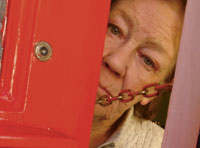
A Supreme Court judge has backed giving social workers the power to enter the homes of people when adult abuse is suspected, Community Care has discovered.
Baroness Hale, an expert on social care law, said the measure would help give adult protection the priority given to child protection within councils. She made her comments in her response to the Law Commission’s review of adult care law, which is publishing an analysis of consultation responses today (Thursday, 31 March).
“There is at the very least a need for a power to gain entry to premises and access to a person thought to be at risk and to interview and, if appropriate, examine him or her in private,” Hale said.
“Experience shows that such powers have an impact, not only on the willingness of individuals to co-operate, but also on the priority given to such work by social services and other professionals.”
Social workers can currently only enter a person’s home by force if they can persuade the police to accompany them for the purpose of “saving life and limb”, under the Police and Criminal Evidence Act 1984.
The Law Commission had proposed introducing a duty on councils to investigate cases of suspected adult abuse. But Hale said this would need to be backed up with powers strong enough to allow those investigations to take place effectively.
As one of the most senior judges in the land and as an expert in this area, Hale’s comments will carry significant weight. The Law Commission’s final report will be published in May, and this will inform legislation on social care next year.
However, the issue of entry powers has proved controversial in the past, splitting the social care sector.
Mental health charity Mind has previously conducted research showing it could undermine people’s rights to privacy and similar powers already in existence in Scotland have been described as “oppressive” and “illiberal” by disability network Radar.
Gary FitzGerald, chief executive of Action on Elder Abuse, said he backed Hale’s comments 100%, but cautioned that there needed to be checks and balances on any powers of entry: “What I don’t want to see is any individual social worker exercising powers over an individual.”
“The danger of the human rights/anti-intervention arguments are that they see the individual outside of their social context in that their right to make unwise decisions may well impact on others such as their family members or neighbours,” said Peter Morgan, chair of the Practitioner Alliance Against Abuse of Vulnerable Adults (Pava).
However, Marije Davidson, public affairs manager at Radar, said: “We should avoid any assumption that a disabled person or any person receiving social care is automatically ‘vulnerable’. This is a major difference with child protection and must be taken account of.”
What do you think? Join the debate on CareSpace
Keep up to date with the latest developments in social care. Sign up to our daily and weekly emails
Related articles
Law Commission to draft new adult social care law
Sector split over need for forced entry powers
Law Commission bids to clear adult social care of legal anomalies


 Bournemouth, Christchurch and Poole
Bournemouth, Christchurch and Poole  Hampshire County Council
Hampshire County Council  Lincolnshire County Council
Lincolnshire County Council  Norfolk County Council
Norfolk County Council  Northamptonshire Children’s Trust
Northamptonshire Children’s Trust  South Gloucestershire Council
South Gloucestershire Council  Wiltshire Council
Wiltshire Council  Wokingham Borough Council
Wokingham Borough Council  Children and young people with SEND are ‘valued and prioritised’ in Wiltshire, find inspectors
Children and young people with SEND are ‘valued and prioritised’ in Wiltshire, find inspectors  How specialist refugee teams benefit young people and social workers
How specialist refugee teams benefit young people and social workers  Podcast: returning to social work after becoming a first-time parent
Podcast: returning to social work after becoming a first-time parent  Podcast: would you work for an inadequate-rated service?
Podcast: would you work for an inadequate-rated service?  Family help: one local authority’s experience of the model
Family help: one local authority’s experience of the model  Workforce Insights – showcasing a selection of the sector’s top recruiters
Workforce Insights – showcasing a selection of the sector’s top recruiters 

 Facebook
Facebook X
X LinkedIn
LinkedIn Instagram
Instagram
Comments are closed.